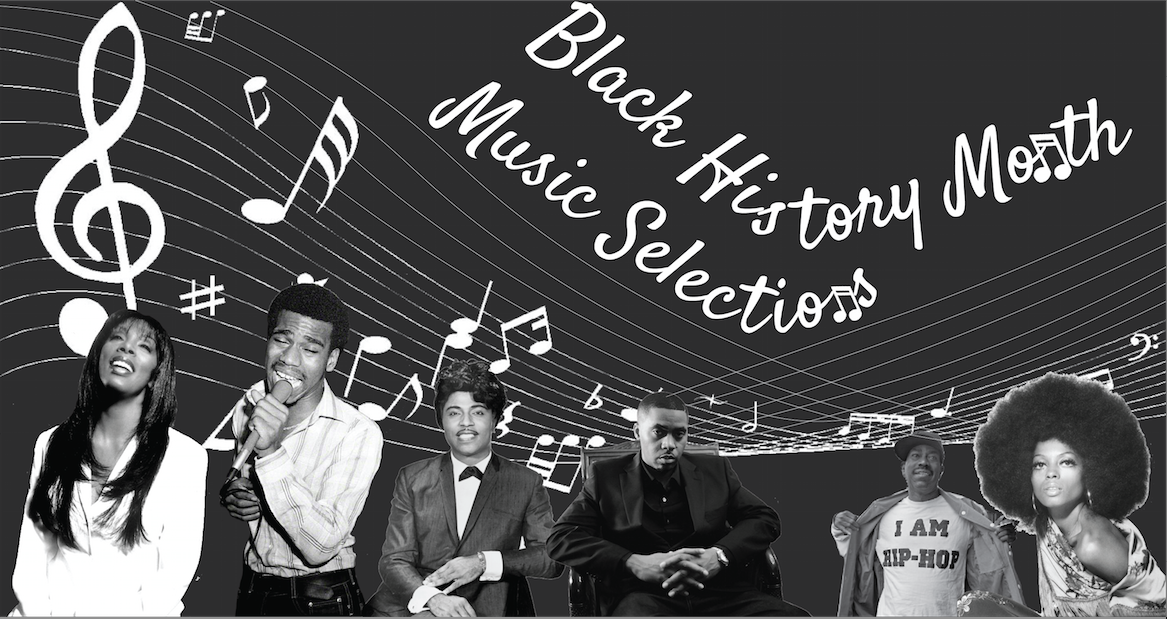Celebrate black history month through music, through the times
Black History Month is upon us once again — a time that allows us all to celebrate the culture that African Americans have contributed to this nation. One of the most notable contributions from African Americans to American pop culture is music, which has helped to define every generation since the birth of the nation. African-American musicians have been pioneers in nearly every genre you can think of, and it’s important to celebrate their work and give it the proper respect it deserves.
The ’50s and ’60s: Evolution of rock ‘n’ roll, R&B and soul
Back in the ’50s, as a result of black artists mixing the blues and gospel church music together, African Americans swept the nation with the birth of rock ‘n’ roll. The wail of the blues could be heard in the loud and exciting sound of artists like Little Richard, artists like Chuck Berry utilized the uplifting spirit of gospel to influence their sound and the call and response and backing of background singers in gospel influenced doo-wop — another popular form of rock ‘n’ roll. Doo-wop is what most people think of when they think of ’50s music, and with good reason, since it has a characteristic cheerful and bubblegum pop sound to it.
From rock ‘n’ roll, black musicians started to take a detour. There were still hard rockers who adapted to the change to psychedelic rock, like Jimi Hendrix, but doo-wop went on to evolve into R&B and soul music. Two conglomerates heavily dominated black music at this time: Stax Records, located in Memphis, and Motown Records, located in my hometown, Detroit. Stax Records had a more soulful sound, more akin to a bluesy sound, while the Motown sound begged the listener get out of their seat and dance, and with a lineup like The Temptations, Marvin Gaye, The Supremes and The Jackson Five, it’s impossible not to dance when hearing the happy vocals of these artists. Motown and Stax Records found the key to what the American people wanted in music. Stax Records appealed to the crowd that wanted more depth in their tracks, while Motown found its crowd in the mainstream. While they were different in nature, they both came to influence one of the most controversial decades in black music history.
The ’70s: Advent of disco and hip-hop
The ’70s gave rise to disco, which was met with love and hate from fellow musicians and listeners alike. Disco music is long and repetitive, created for the sole purpose of making people dance. Some black artists, like Diana Ross, Donna Summer and even Michael Jackson, embraced the disco era and produced disco classics. Like I said before, it’s long and repetitive, and after countless car rides with my dad playing songs from his personal collection, it’s hard to tell where one song ends and a different begins.
Black artists who went against the grain continued down the soul route, and many black artists, such as Isaac Hayes, Marvin Gaye, The Spinners and countless others, further delved into their black identity and did wonders for the genre of soul. There are many gems from this era that are often overlooked because of disco, but it’s incredible to see what sorts of sounds were coming from these black artists. For example, Roy Ayers would soon become one of the most sampled artists by rappers and hip hop groups to come, while The Delfonics explored bigger sounds with their full orchestra in the classic song “Didn’t I (Blow Your Mind This Time).”
After soul had its day in the sun, hip-hop came for its time in the spotlight. Hip-hop is especially important in the history of black music, because black music became the forefront and widely accepted mainstream of America. In the ’80s, hip-hop was more tame and playful; Grandmaster Flash and the Furious Five, Run DMC, Kurtis Blow and others introduced this brand new art form to America. Sampling, intricate rhyme schemes and good, clean fun gave listeners an insight into the talents of black musicians.
The ’80s and ’90s: Rap rules
’80s rap was tame for the most part, but late-’80s and ’90s rap gave rise to a more realistic, aggressive and socially conscious style called gangsta rap. Gangsta rap is a staple for black musicians, as it allows them to vent their frustrations and educate their listeners on the bleak realities of the struggles that they must go through as African-Americans. NWA spoke out about police brutality, Notorious B.I.G. spoke about what it was like to grind before his rise to fame and Nas paints an accurate picture of what growing up in the ghettos of New York is like, which isn’t pretty, to say the least. It wasn’t all bad, however, as rappers also kept the spirit of having fun in black music alive; The Pharcyde told a great and all too relatable story of unrequited love, Snoop Dogg told you about what he likes to sip on from time to time and Ice Cube described a pretty good day (it’s supposedly January 20, 1992).
Black musicians now are still making strides in almost every genre of music. Doo-wop, soul and disco are still being made, believe it or not. Hip-hop remains a large part of mainstream culture in America. R&B is still as prominent today as it was in the Motown days. Most importantly, black musicians are still inventing new sounds that will inevitably become the next big thing in music, while still paying homage to the great black musicians that came before them. Black artists have given so much to music over the years. This month, let’s celebrate their contributions.

